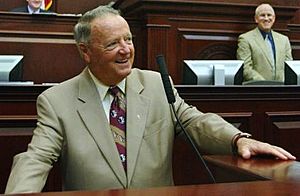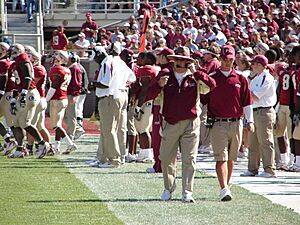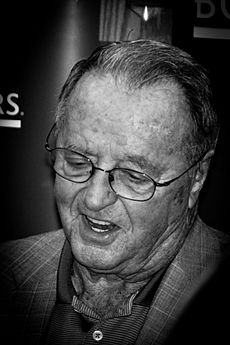Bobby Bowden facts for kids

Bowden in 2007
|
|
| Biographical details | |
|---|---|
| Born | November 8, 1929 Birmingham, Alabama |
| Died | August 8, 2021 (aged 91) Tallahassee, Florida |
| Playing career | |
| 1948 | Alabama |
| 1949–1952 | Howard (AL) |
| Position(s) | Quarterback, running back |
| Coaching career (HC unless noted) | |
| 1954–1955 | Samford (assistant) |
| 1956–1958 | South Georgia State College |
| 1959–1962 | Howard (AL) |
| 1963–1965 | Florida State (WR) |
| 1966–1969 | West Virginia (OC) |
| 1970–1975 | West Virginia |
| 1976–2009 | Florida State |
| Head coaching record | |
| Overall | 377–129–4 |
| Bowls | 21–10–1 |
| Accomplishments and honors | |
| Championships | |
| 2 National (1993, 1999) 12 ACC (1992–2000, 2002–2003, 2005) 2 ACC Atlantic Division (2005, 2008) |
|
| Awards | |
| Bobby Dodd COY (1980) Walter Camp Coach of the Year Award (1991) Amos Alonzo Stagg Award (2011) |
|
| College Football Hall of Fame Inducted in 2006 (profile) |
|
Robert Cleckler Bowden (November 8, 1929 – August 8, 2021) was a famous American college football coach. He led the Florida State Seminoles team at Florida State University (FSU) from 1976 to 2009. Many people think he was one of the best college football coaches ever because of his amazing success with the Seminoles.
During his time at Florida State, Coach Bowden helped FSU win two national championships. They won in 1993 and again in 1999. His teams also won twelve Atlantic Coast Conference (ACC) championships after FSU joined the conference in 1991. The Seminoles were incredibly strong, finishing as a top-5 team in the Associated Press poll for 14 years in a row. This was a record that no other team came close to.
However, the team's performance slowed down in the mid-2000s. After a tough 2009 season, Coach Bowden left his coaching role. He made his last coaching appearance in the 2010 Gator Bowl game on January 1, 2010. His team won 33–21 against his former team, West Virginia.
For a while, Coach Bowden was in a close race with Joe Paterno to become the winningest NCAA Division I college football coach. They were often just one game apart in wins. However, some of Bowden's wins from 2006 and 2007 were later removed due to an academic issue. This brought his final career record to 377 wins, placing him second to Paterno's 409 wins.
Contents
Growing Up and Early Life
Bobby Bowden was born in Birmingham, Alabama. When he was 13 years old, he became very sick with rheumatic fever. He had to stay in the hospital for six months and then in bed at home for over a year. While he was sick, Bobby listened to news about World War II on the radio. This made him interested in history for the rest of his life. He also started listening to University of Alabama football games on Saturdays, which sparked his love for the sport.
Bobby was a great football player at Woodlawn High School. He earned a scholarship to play as a quarterback for the University of Alabama. After one semester, he returned to Birmingham and married his high school sweetheart, Ann Estock, in 1949.
He then transferred to Howard College, which is now called Samford University. There, he played football, baseball, and ran track. He was also a leader in his college fraternity. In his senior year, he was captain of the football team and earned "Little All-America" honors as a quarterback. Bobby Bowden graduated from Howard in 1953.
Starting His Coaching Career
After college, Bobby Bowden became an assistant football coach and head track and field coach at Howard College from 1954 to 1955. He then became the athletic director and head coach for football, baseball, and basketball at South Georgia State College from 1956 to 1958. After a tough basketball season, he even fired himself as the basketball coach!
Bowden then went back to Howard as the head football coach. He had a great record there, winning 31 games and losing only 6 between 1959 and 1962. In 1962, he moved to Florida State University as an assistant coach.
Later, he became an assistant coach at West Virginia University (WVU) in 1965. When the head coach left in 1969, Bowden took over. He coached WVU to a 42–26 record before returning to FSU as head coach in 1976.
During his first year as head coach at WVU, a tragic plane crash killed many players and staff from the Marshall University football team. Coach Bowden wanted to help. He offered Marshall's new coach, Jack Lengyel, access to his team's game films and playbooks. This helped the Marshall team rebuild after the tragedy.
Leading Florida State
Bobby Bowden became the head coach of the Florida State Seminoles in 1976. He had coached wide receivers there before. He chose FSU because the weather was warmer than in Morgantown. Also, Tallahassee was closer to Birmingham, Alabama, where his mother lived. The team had not been doing well, with only 4 wins in the three seasons before he arrived. He initially thought he would only stay a short time.
However, Bowden quickly found success at Florida State. By his second year, the team won 9 games and lost only 2. He decided he was happy to stay at Florida State for his whole career. He even turned down coaching offers from other big college teams like Alabama and LSU, and even from the National Football League's Atlanta Falcons.
During his 34 years as head coach, he had only one losing season, which was his very first in 1976. From 1987 to 2000, the Seminoles won at least 10 games every season. They also finished in the top 5 of the Associated Press College Football Poll. They won national championships in 1993 and 1999. The team was especially dominant after joining the Atlantic Coast Conference (ACC) in 1992. They won or shared nine ACC titles in a row from 1992 to 2000.
The Seminoles reached the national championship game for a third time in a row after the 2000 season, but they lost to Oklahoma. The next season, they had a surprising loss to North Carolina. This was only their third loss ever in ACC play. They finished that season with 8 wins and 4 losses, which was the most losses they had in 15 years. It was also the first time they didn't win at least a share of the ACC title since joining the league. After this, Bowden's team only made it into the top 10 of a final poll one more time, in 2003. That was also the last time they won 10 games in a season.
The Bowden Bowl Games
Florida State and Clemson are in the same division of the ACC for football. This meant their teams played each other every year from 1999 to 2007. These games became known as the "Bowden Bowl." This was because Bobby Bowden was the coach for Florida State, and his son, Tommy Bowden, was the coach for Clemson.
Their game in 1999 was the first time in top-level college football history that a father and son faced each other as opposing head coaches. Bobby won 5 of these games, while Tommy won 4. The "Bowden Bowl" games ended when Tommy Bowden resigned from Clemson halfway through the 2008 season.
Family Life and Passing
Bobby Bowden married his childhood sweetheart, Ann Estock, in 1949. They had six children and 21 grandchildren. Bobby was a Christian and believed his faith helped him succeed in football.
Bobby was not the only coach in his family. His son Tommy Bowden was the head coach at Clemson University. Another son, Terry Bowden, was the head coach at Auburn University. A third son, Jeff Bowden, was the offensive coordinator at Florida State. All three Bowden men who were head coaches had an undefeated season at some point. However, only Bobby's teams won national championships.
Bobby Bowden passed away on August 8, 2021, after a serious illness. Many people honored him across Florida and Alabama. He lay in honor at the Florida Capitol Building and at the Moore Athletic Center at Florida State. A memorial service was held in Tallahassee. He also lay in repose at Samford University before being buried in Trussville, Alabama.
Awards and Honors
Bobby Bowden received several important coaching awards. He won the Bobby Dodd Coach of the Year Award in 1980. He also received the Walter Camp Coach of the Year Award in 1991. In 1992, he was given the Amos Alonzo Stagg Coaching Award for his great achievements as a coach.
Awards Named After Him
Two awards have been created to honor Bobby Bowden and his contributions to football.
- Bobby Bowden National Collegiate Coach of the Year Award: This award started in 2010. It is given each year to a college football coach who shows great success on and off the field. The award recognizes qualities like perseverance, good attitude, honesty, and determination, which Bobby Bowden showed throughout his career.
- Seminole Tribe of Florida Bobby Bowden Student-Athlete of the Year Award: This award began in 2003. It honors a college football player who excels on the field, in the classroom, and in their community. The Fellowship of Christian Athletes started this award, and the Seminole Tribe of Florida became its official sponsor in 2013.
In 2011, Bobby Bowden also received the Children's Champion Award for Leadership Development. This was for his work with the Fellowship of Christian Athletes, helping children.
Coaching Achievements
In his 44 seasons as a head coach, Bobby Bowden had 40 winning seasons. This includes 33 winning seasons in a row at Florida State. From 1987 through 2000, his Florida State teams won 10 or more games for 14 straight seasons. They also finished in the top five of the major polls every year during that time.
 | Selma Burke |
 | Pauline Powell Burns |
 | Frederick J. Brown |
 | Robert Blackburn |



